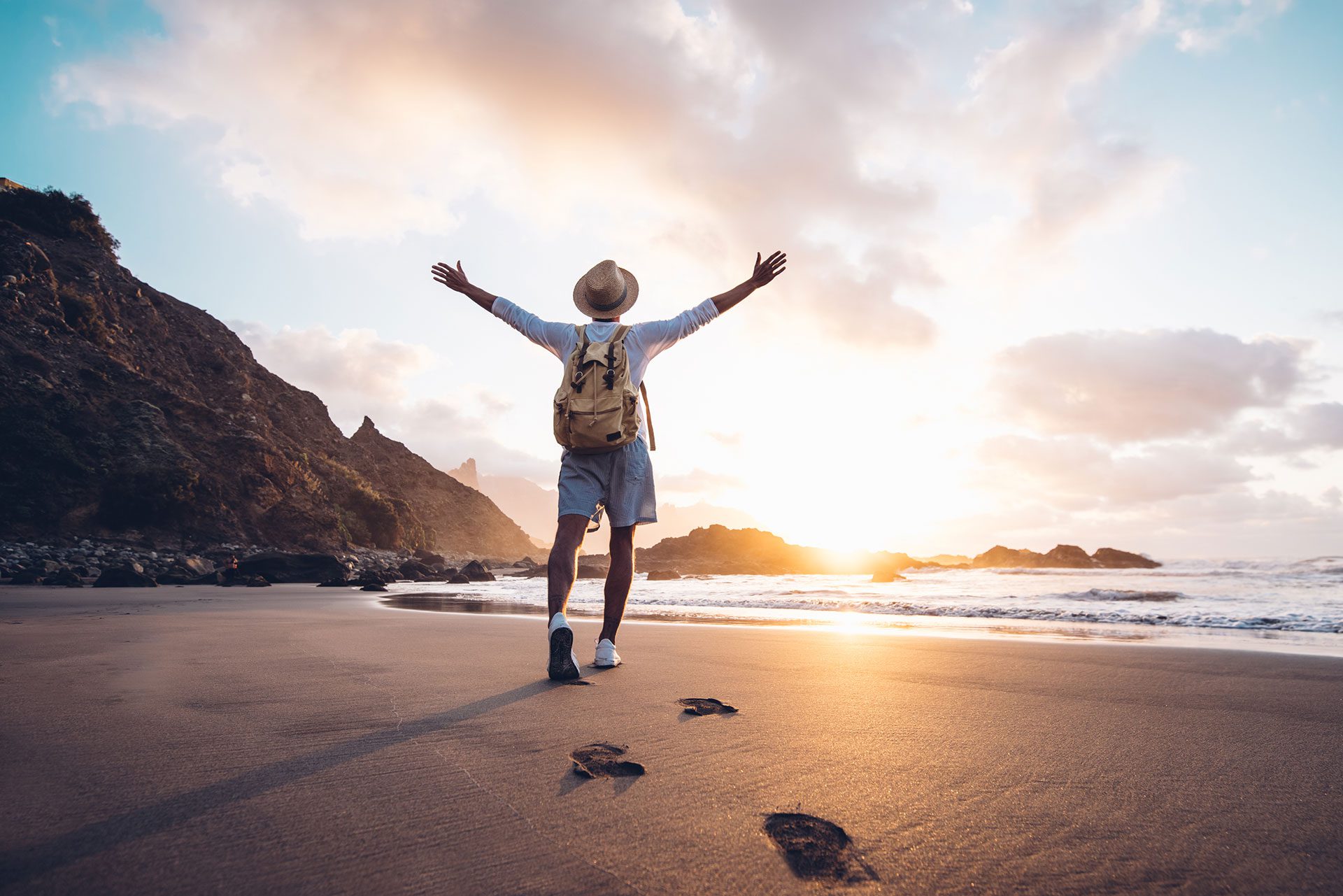Like most industries, the travel sector has seen a dramatic decline throughout the pandemic. From lockdowns and work from home mandates to vaccine and testing requirements, companies have had a barrage of obstacles to overcome. At last, the tide is changing and after years of standing still, people are ready to travel.
For some, it has been long overdue. For others, it is a reward offering a light at the end of a long, dark tunnel. Whatever the reason, travelers are gearing up to get away and the travel industry is busy adapting to the new normal to accommodate this exciting time for travelers.
As much as companies would love to rewind to the pre-pandemic days, there are considerations to be made as the world is different than it was for travelers in 2019. According to Destination Analysts, Americans are more excited to travel in the coming year than they have been in the pandemic era.
Destination Analysts has been conducting market research on over 1200 American travelers to get their perceptions and opinions on the topics surrounding traveling throughout the pandemic. With declining positivity rates and nationwide vaccination rollouts, people are feeling more confident about the safety of travel.
Priorities for Travel in 2022
After staying close to home, what are travelers looking for in their 2022 getaways? Not surprisingly having fun, relaxing, finding happiness, and escaping stress round out the top four priorities for American travelers in the coming year. The majority of Americans surveyed by Destination Analysts at the start of the year noted wanting to spend more time with loved ones, immerse themselves in nature, get away from crowds, and visit a new place they have not previously been to before.
Experiences are also a crucial component when it comes to planning trips this year. After a rather boring existence staying in, attending virtual shows, and ordering takeout Americans are ready to get out and do those things that they’ve missed. While many are looking to unwind in nature, take road trips, and visit national parks, there are also many people who want a big-city adventure.
Theme parks, festivals, and culinary experiences all take rank when figuring out the preferences of future travelers. As in previous years, warm-weather destinations, beaches, and resorts will be desirable for upcoming trips.
Traveling for Business or Pleasure? Or Both?
While a vast majority of people are craving the escape of a vacation for pleasure, we cannot discount the flexibility that has been found through remote work. Many companies have concluded that remote work is not only feasible, but work from anywhere opportunities are having a positive effect on their bottom line.
This has resulted in many employees taking advantage of the possibility to work from anywhere to take workcations. A change of scenery, fresh experiences, and a break from the home office proved to be an alluring reason to travel during the pandemic.
Countries around the world took notice of the desire to travel while working and have created special visas for tourists hoping to work from their travel destination. Costa Rica, Australia, Aruba, and Iceland offer varied opportunities for vacationers to escape the monotony of home while working remotely from their trip. While business trips came to a screeching halt, with many conferences and large events canceled, the rise of the workcation has provided employees with the opportunity to travel for work on their own terms.
Rebranding to Target Travelers In the New Normal
With motives for travel changing, brands have had to adapt their campaigns to stay relevant to the goals of future travelers. While most brands made adjustments to cancellation policies, adopted stricter cleaning protocols, and stressed safe travel, others found areas to rebrand in order to attract hopeful travelers.
Reuniting with Larger Groups
Hilton began a campaign to encourage travelers to book with them when reuniting with loved ones. In order to accommodate larger groups, the hotel chain began offering the Confirmed Connecting Rooms enhancement to their booking system through their website and on the Hilton Honors app. Hilton understands the demand for larger groups of people to stay together as travel begins to increase and people are looking forward to reuniting with friends and family.
By offering this solution, Hilton has identified a need for travelers and created a simple solution at no additional cost to the guest. This offer not only adds a layer of convenience but also ensures peace of mind for the traveler.
Finding a Remote Work Destination
Kayak launched a Work From Wherever Guide in response to the uptick in employees wanting to take advantage of the flexibility of working from anywhere. Through this campaign, Kayak highlighted the perk of remote work policies and offered insight for prospective travelers to help decide their destination.
The guide compares 111 countries giving rankings on 22 factors including weather, safety, social life, and local prices. The comprehensive list gives a wealth of information to help users discover a location that would best accommodate their remote work. In addition, the website offers resources to help users find a timezone that best fits their job requirements.
The site also uses travel data to explore the top destinations to give insight into the trending places to visit for work-from-home opportunities. This campaign gives travelers all of the information needed to make an informed decision and create a plan for upcoming travel.
Industry Insights
Conveniences Are Here to Stay
While brands are rebranding to meet the needs of travelers, some conveniences that have become commonplace throughout the pandemic are now the norm. Priorities may be shifting for people as they travel, but the expectation for convenience remains constant. Like other industries, accommodating the customer will be key to ensuring their satisfaction.
Contactless Check-In/Out
Allowing guests to check-in and out of a hotel without having a face-to-face interaction has become commonplace during the pandemic. This option allows guests to efficiently access their room as they are provided with check-in instructions via email or text. This means guests aren’t having to wait in line to check-in, but can instead head straight to their room. It improves first impressions and provides customers with the convenience they have come to expect.
For businesses, contactless check-in allows your employees to use their time for other tasks to make the guests’ stay more welcoming. With the positives for both provider and guest, contactless check-in is a trend that is here to stay.
Flexible Booking
Across the travel industry, companies adopted free cancellation and flexible booking options to accommodate the changing needs of customers. Since travel restrictions were ever-evolving, airlines and hotels began offering these flexible options for leery travelers. While the convenience for consumers is an advantage, it makes it hard for businesses to project their occupancy and potential revenue when a free cancellation is an option.
Instead, free cancellation policies will likely disappear as brands pivot to a flexible booking option. This can be tailored to the company which may allow a certain time frame for cancellation, an opportunity to rebook, or a credit for future travel.
Purpose-Driven Travel
With many people having felt isolated during the pandemic, there is a deeper sense of purpose and wanting to make a difference. Discover Corps is one company that “gets it” when it comes to purposeful travel, and they’re thriving because of it. The B-Corporation offers a unique experience beyond a traditional travel site. Their mission is to give clients an unforgettable experience while allowing them to positively impact the places they visit.
“We are firm believers that travel can be transformative and that it can serve as a force for good in the communities that we visit across the globe” says Discover Corps’ Executive Director Alex DuBois. “Our trips are designed in a way that allows parents to pass on their values and love of our world’s most unique cultures, wildlife and landscapes to their children. This is more important than ever after past two years,”
Discover Corps partners with teams that connect travelers with inspired initiatives to make the world a better place. Their trips include experiences in wildlife conservation, women’s empowerment, community development, and environmental preservation, combining immersive cultural experiences with volunteer projects.
This allows visitors to have a hands-on approach to contributing to the partner organizations. These unique travel opportunities go beyond a traditional trip as participants work towards the greater good.
In short, this is an appealing option for globe trotters looking for meaningful travel after the pandemic highlighted so many humanitarian issues facing our world.
Importance of Loyalty Memberships
As brands compete to give travelers a positive experience, the benefits of loyalty memberships will continue to make brands marketable. By tying perks like free cancellation, reward points for future travel credit, or early check-in to these loyalty systems, companies can ensure customers keep coming back for their travel needs. These programs are a great way to connect with travelers, learn their needs, and provide a more personalized experience.
Accommodate Conscientious Travelers
Whether it was the extra time spent at home or inner reflection over the past years, people are more aware of their impact on the world. Many retail brands are highlighting ways they are decreasing their carbon footprint or using sustainable packaging. The travel industry is also grappling with the heightened awareness of consumers who want to travel responsibly. Potential travelers are looking for brands that are working toward sustainability and consider their environmental impact.
Sustainability in Hospitality
Marriott has met this challenge head-on by launching a Serve 360 initiative that highlights its commitment to doing good globally through its 2025 Sustainability and Social Impact Goals. Marriott recognizes its global responsibility and outlines its plan to become more sustainable through responsible sourcing, reducing its environmental footprint, and increasing its renewable energy use.
Outside of the call for environmental actions, Marriott is also pledging volunteer hours to the community, allotting 50% for outreach programs for children and youth. The company is also empowering diverse groups of people by pledging $35 million to provide in-depth programs and training for underrepresented groups. Hotel on-site associates will also complete human rights training which includes human trafficking awareness, responsible sourcing, and recruitment policies.
Through its Serve 360 dashboard, Marriott hopes to create transparency in its ongoing mission to find solutions to pressing environmental and social issues.
Marketing for Post-Pandemic Travel
Social Media and Search Ads
Social media is a powerful tool for the travel and tourism industry to connect with potential clients. Brands need to have a presence where travelers are spending their time scrolling. Social media provides a platform where users explore, become inspired, and are influenced by the images, videos, and conversations that are had through posts of people they know in real life or follow virtually.
Facebook and Instagram ads can influence a person’s travel destination through captivating images, unique experience offerings, and highlighting promotions for specific booking windows. PPC ads that showcase an experience versus a hotel room or travel booking are likely to attract travelers.
Similarly, search Ads that are personalized to the targeted audience gain more traction. Personalized promotions, affordable travel choices, and last-minute booking options can appeal to the preferences of your audience. PPC ads also inform your marketing team to determine what is working for your brand and how you can best reach potential travelers as they search for the things that matter most when booking their travel destinations.
In the travel space specifically, PPC ads don’t fit into a one-size-fits-all box. There are many different ad types available on both social media and search platforms like Google and Bing:
- Video Ads
- Single image and slideshow formats
- Carousel ads
- Collection format ads
- Dynamic ads
Understanding PPC and how to utilize paid media post-pandemic is a big subject. Visit here for more information.
User-Generated Content
Trips are not purchased spontaneously and people will spend a lot of time researching, comparing, and planning the perfect destination, accommodations, and experiences that fit their expectations and budgets. User-generated content has given travelers authentic reviews and content to drive their decision-making.
According to a Trip Advisor survey of 23,000 travelers from around the world:
- 86% of respondents feel more comfortable in their decisions about an upcoming trip after reading reviews left by fellow travelers on the site
- A whopping 81% always or frequently read reviews before planning where they will stay
- 72% rely on reviews to decide where to eat and things to experience while on their trip
- 52% of respondents agree that they would not book a stay at a hotel that didn’t have reviews available.
People trust the authentic reviews of others who have traveled before them. Having recent reviews is important to potential travelers, as they want to know the most up-to-date perspective on the hotel property, food, and excursions. On average, a Trip Advisor user will read 9 reviews before making a booking, often focusing on the most recent.
Authentic photos are also a great way to encourage bookings, as people trust the pictures that are posted by vacationers over the professional photos posted on a website. Seeing the unfiltered, real thing gives credibility to the travel website and helps users visualize their vacation. Photos can act as an inspiration piece as users book similar accommodations to mirror the experiences they see online.
Included on their site is a scrolling collection of reviews from recent travelers including their date of travel, rating, and specific comments.
Virtual Reality
Today’s traveler wants to research and be confident about the choices they make when it comes to booking their stay. Offering virtual reality options can help take the guesswork out of booking accommodations for potential travelers. Virtual tours around a facility can help your potential guest see the highlights of staying at your location. It gives travel brands an opportunity to showcase outdoor entertainment spaces, on-site services, and activities that engage travelers.
For accommodations, offering 360-degree views of living spaces, hotel rooms, and balcony views can let the potential guest see exactly what they are getting when they decide to stay at your facility. By offering this inside look, customers can confidently book the right lodging that works for their needs. It also helps your brand to live up to the expectation of the traveler by laying out what you have to offer through a virtual experience prior to their visit.
Chatbots
The booking process for travel comes with a lot of questions from the booking process through the trip itinerary. Chatbots are being used across many online industries as a way to connect with consumers by conveniently helping them find the information they require. Chatbots can engage with website visitors to offer assistance in finding a specific answer to a question.
The Cosmopolitan of Las Vegas is leveraging this artificial intelligence technology to engage with guests throughout their stay. Rose is branded as their “ultimate insider” available 24/7 to answer questions, give recommendations, and accommodate your needs. Hotel guests can text Rose to get tickets to an event, recommendations for dinner, or even a fresh towel. This digital concierge service gives a personalized experience to the consumer while answering common questions virtually.
Key Takeaways
- The travel industry is expected to boom in the coming years as post-pandemic travelers search for ways to reconnect, relax, and take advantage of experiences while they travel to new destinations.
- Travelers will continue to go to the internet first for preliminary searches about their destinations. Social media platforms will serve as inspiration for upcoming trips and reviews and recommendations from other users will continue to influence decisions.
- Marketing to prospective travelers requires personalization to meet their unique needs. The use of targeted ads and artificial intelligence can inform decisions to best advertise directly to your audience.
Sources
- https://www.destinationanalysts.com/insights-updates/
- https://help.hilton.com/s/article/Confirmed-Connecting-Rooms
- https://www.kayak.com/work-from-wherever
- https://serve360.marriott.com/
- https://discovercorps.com/
- https://tripadvisor.mediaroom.com/2019-07-16-Online-Reviews-Remain-a-Trusted-Source-of-Information-When-Booking-Trips-Reveals-New-Research
- https://www.cosmopolitanlasvegas.com/rose



